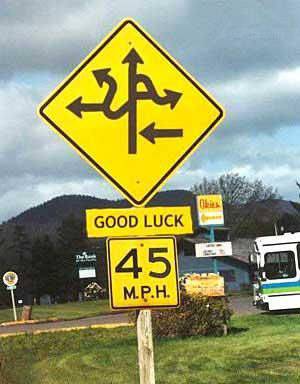
Reading is Reading.
Hello, Hello, Hellooooo English 332 (and anyone else who may have stumbled upon this site). My name is Karen, I am a third year student currently in the pursuit of an English Education and Anthropology major with the minors of Global Development and Linguistics (yup you guessed it, I’m going to be here awhile). Language and culture are fascinating to me so much so that I would one day hope to teach abroad. These are all more recent revelations, but now to take it back, waaaaaay back…
When I was a child my first language was Spanish. After entering kindergarten in a public elementary in Moreno Valley, California I began to learn English. One of my earlier memories of reading are that of my father encouraging me to read freeway and street signs. He would have me read them aloud on car rides so that he wouldn’t get “lost”. It would give me a great sense of pride and accomplishment thinking that I could read the sign so quickly and that I was the reason we got to whatever our destination was. Of course, my dad knew better than I did where we were going. To this day he’s convinced that if he were to blind fold me and spin me around three times it would be enough to get me lost (he’s right sadly). Still he thought the quick reading practice was good and I’m sure it melted his heart to see me light up at the thought of helping him. (After all I was a pretty cute kid :D ha)
The excitement of school and learning made it to where English was my more practiced language not just in school, but in home as well. My parents, having migrated to the states at fairly young ages, both understood English. My father actually received partial schooling after having migrated with his family from Mexico, so he is especially understanding and fluent in the English language. Still I was encourage me to speak Spanish, but it was clear to see that my schooling was influencing my preference towards English. As would be expected, my parents eventually stopped nudging me to speak it. I speak Spanish when I’m especially passionate about something. Other instances include when I’m specifically talking to my mother, because her preference is Spanish. Lastly, in my interactions at home and with peers I have tendencies of speaking both languages.
This idea of “code-switching” is one I found especially interesting when taking a major anthropology course of language and culture last semester. Code-switching the practice of switching from one language to another in one conversation.One of the most interesting things I learned about the behavior was that regardless of being a frowned upon, code-switching is actually indicative of fluency in both languages being spoken. When reading Szwed’s article on literacy I was immediatly reminded of this prior knowledge. Szwed goes on to state that “one can only ‘violate’ the rules when onew has mastered them.”, which is the case with seemingly “illiterate” Latino American youth (typically children of immigrants) that practice code-switching in America today.
Language is culture and vice versa. Part of the reason people code-switch is because they identify with multiple cultures. Times are most definitely changing, but that is not to say that we are an “illiterate” generation. Much to my surprise people are reading more now than ever before.
Being an English major people have the tendency to believe that I am excellent with grammar, spelling, and all that jazz. Quite frankly, I have Microsoft Word to thank most time. I’m also not as well read as people would think either. At least not in conventional ways. I read and write what my university professors expect me to, and occasionally (if I have the time) I take reading suggestions from peers. What I can for a fact say that I have constant access to is social media! Meaning I’ll read what ever article I see on my Facebook news feed that I’ve deemed worthy of my lunch or down time indulgence. Is all of it great writing? No. Is it all academic or intellectual? I’ll be the first to admit, NO. Regardless, it is a practice of my skills and ability. I’m a full time student with a part-time job. I have more time to read a short article than I do a novel, and for right now I’m fine with that.

 Website:
Website:
One Reply to “Reading is Reading.”
Hello! I have some experience with some code switching. I haven’t personally done it, as I am not fluent in any languages other than English and sarcasm. However, I think that code switching is what made taking Spanish in school easier for me. Many of my classmates in elementary school were native Spanish speakers who had recently come to the US, and their code switching helped me to understand some new words when I was trying to learn. I used to be the person who people turned to for grammar and spelling, because they knew I planned on being and English major, but I have to agree: Microsoft Word is my savior!